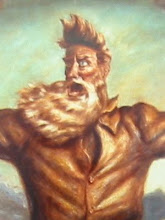As a result, we try to work in the shade when possible. A simple thing, but one born from experience and necessity. It does present an occasional problem for me however.
In the above image, the subject is very underexposed and the background is about where I want it. Fortunately, I have some editing tools which can help with these issues. Like most problems, exposure problems are best dealt with in the camera, keeping editing to a minimum. The above shot was a "throw away", meaning that I looked at it right after I shot it and didn't like what I saw. I chose to change position rather than deal with the high contrast of the scene. I usually would have deleted this right then, but decided to keep it and play with it to see if I could salvage the shot. When I am shooting emergency scenes, there are no second chances, sometimes you have to make chicken soup out of chicken manure. That is when editing tools really can come to the rescue. So to speak.
This is the same image with a partial correction. I have brought the subject up to a proper exposure, but the background is washed out. Not only is a lot of detail lost in the background, it is just plain unpleasant to look at.
Every time you screw with an image, you degrade it, every correction comes with a price. The key is to take the best image you can, keeping editing to a minimum. The type of photography that I enjoy is rarely done under ideal lighting conditions. In fact, incidents usually occur under adverse lighting conditions. Editing allows me to capture the scene, even when I screw up the shot.
Thanks for reading,
Schmoe





Did you consider using a fill-flash for that picture? That's one of the standard techniques for bright sunny, high-contrast shots.
ReplyDeleteCapt. Schmoe,
ReplyDeleteAre you shooting in raw or jpg? If you shoot in raw mode you are able to do a great deal more and it dOes not degrade the image at all. Plus dodging and burning is my friend.
fche - I do occasionally use fill flash, but often when working I don't like to carry the flash on the camera. The camera/lens is bulky enough without it, with the speedlight attached it makes it even more difficult to tuck under my coat. Plus the flash hits my helmet. I do sometimes use the pop-up, but mine has stopped working for some reason. I need to get it fixed, but I don't want to be without my camera!
ReplyDeleteMichael - I shoot in raw, with a jpeg capture as well. The price I pay when making major adjustments - even in raw, is a change in color/contrast that I never seem to get quite perfect. I really like the way noise can be addressed in raw and I like the the clarity of the image. With a 16gig flash card, I have to be careful about downloading. I have filled it up a few times on long weekeends and have had to cull the herd from my camera.
Live and learn I guess.
Thanks for the comments - have fun with your cameras.
Captain Schmoe,
ReplyDeleteThanks for the great post on photography, I shoot a lot of aviation photography which has a lot of the same challenges as you do. Photoshop is definitely a good tool to have, but I prefer to shoot in more ideal situations too. Just ordered a new D7000 camera that I'm looking forward to getting too!
YYC Dispatcher
YYC/Anon - Thanks for the comment. Congrats on the new camera, I hear great things about the D7000. I love to take pictures of aircraft as well and I can appreciate the challenges.
ReplyDeleteFor me, cockpit photos are a real challenge, especially in flight. The only way I have had success is to properly expose the outside (runway on Short final) then use editing to bring up the panel and the pilots. Backfill is out of the question, pilots really don't like flash going off on short final!
Wings and tails provide a lot of shadow as well.
Thanks for commenting and enjoy the new camera!